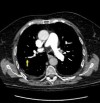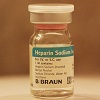
|
The Ottawa Hospital pioneers innovative approach for treating lung blood clots in people with cancer
March 26, 2025
-
Two new research studies show how The Ottawa Hospital continues to lead the way in determining which cancer patients with a blood clot in their lung can safely recover at home and avoid hospitalization.
|

|
Blood thinners can prevent vein blood clots in those with cancer, but results for artery clots are mixed
March 13, 2025
-
“Blood thinners are an effective tool for preventing vein blood clots in people with cancer. The fact they may also prevent artery clots in eligible patients with pancreatic cancer should encourage their use in that population."
|

|
Dr. Deborah Siegal honoured for groundbreaking blood research
February 25, 2025
-
Dr. Deborah Siegal has been awarded the prestigious Joe Doupe Young Investigator Award from the Canadian Society for Clinical Investigation in recognition of her groundbreaking research on treatments for blood clots and blood transfusions.
|
|
Show more news stories
|

|
Researchers at The Ottawa Hospital awarded 16 CIHR grants worth more than $8 million
February 3, 2025
-
Researchers at The Ottawa Hospital are leading 16 new projects funded by the Canadian Institutes of Health Research (CIHR) through the most recent operating grant competition.
|

|
New Canada Research Chairs to advance regenerative medicine, thrombosis and stroke research at The Ottawa Hospital
November 14, 2024
-
The federal government announced a new round of Canada Research Chairs this week, including three based at The Ottawa Hospital.
|

|
Honouring our top researchers of 2024
November 7, 2024
-
Each year, The Ottawa Hospital and its Research Institute honour a small number of outstanding researchers for discoveries and innovations that are improving patient care at TOH and advancing science around the world.
|

|
New scientist profile: Dr. Alexandre Tran aims to personalize blood clot prevention in trauma and critical care
August 27, 2024
-
Whether he’s preparing a trauma patient for surgery or caring for a patient in the intensive care unit, Dr. Alexandre Tran is thinking about how to keep them safe from life-threatening bleeds and blood clots.
|

|
Researchers at The Ottawa Hospital awarded 14 CIHR grants worth more than $10 million
July 18, 2024
-
“Success at CIHR underscores the creativity, dedication and collaboration of our researchers and their teams. Funding for these innovative projects paves the way for groundbreaking advancement in biomedical sciences, improved patient care and progres
|

|
Can AI predict major bleeds from blood thinners?
May 28, 2024
-
“More research is needed before we can use AI tools in the clinic to predict bleeding risk, but this proof-of-concept study shows they hold great promise.”
|

|
New scientist profile: Dr. Yan Xu aims to better understand blood clots in racialized populations
January 2, 2024
-
“Our first step is to understand if there are ethnic and racial differences in the prevention and treatment of blood clots in Canada. And if so, what we can do about it.”
|

|
What’s the best way to prevent blood clots after hip or knee replacement surgery in people with chronic kidney disease?
December 15, 2023
-
Surgery comes with a risk of blood clots, especially joint replacement surgery, so patients are given blood thinners to prevent clots from forming.
|

|
Lifelong treatment with blood thinners is unlikely to have survival benefits for most patients with unexplained clots
August 3, 2023
-
More than 750,000 Canadians will have an unexplained vein blood clot, known as venous thrombosis. Guidelines suggest that these people take blood thinners for life to prevent a second clot, however, the tradeoffs between the benefits, risks and finan
|

|
New scientist profile: Dr. Joseph Shaw investigates best way to “turn off” blood thinners
March 16, 2023
-
Thrombosis physician Dr. Joseph Shaw knows blood thinners are great for preventing blood clots. But sometimes people taking these drugs need to be able to form blood clots again, like before a surgery, or if they start bleeding in the brain or gut.
|

|
Tools can identify which patients should stop taking blood thinners for unexplained blood clots
November 30, 2022
-
Over 750,000 Canadians will have an unexplained vein blood clot in their lifetime, known as venous thrombosis.
|

|
Bench to bedside: the quest to prevent cancer from coming back after surgery
October 20, 2022
-
Researchers at The Ottawa Hospital have made another important step forward in their quest to find innovative ways to stop cancer from coming back after surgery. While surgery often provides the best option for removing all or most of a tumour, resea
|

|
Dr. Marc Carrier recognized as one of top blood clot researchers in Canada
July 13, 2022
-
Dr. Marc Carrier has received a major honour recognizing his outstanding contributions to advancing blood and blood vessel care in both in Canada and around the world.
|

|
Researchers at The Ottawa Hospital awarded 18 CIHR grants worth more than $11 million
February 5, 2022
-
These projects will advance science and improve health in areas such as tuberculosis, blood disease, prostate cancer, heart disease, muscle repair, sleep apnea, brain cancer, medical imaging, virtual care, prehab, intellectual disability, sarcoma, CA
|

|
Helping patients and saving money: Drug that prevents blood clots in cancer patients is cost-effective
January 6, 2022
-
People with cancer are four to seven times more likely to have a blood clot than the general population.
|

|
Tiny clots in the lung put patients at risk of future blood clots
December 16, 2021
-
A study led by Drs. Grégoire Le Gal and Marc Carrier found that tiny clots in the lungs are not as harmless as previously thought, and in most cases should be treated with blood thinners.
|

|
Study establishes bleeding risk with long-term use of blood thinners for life-threatening clots
October 20, 2021
-
A new systematic review and meta-analysis now provides the best data yet on the long-term risks and consequences of bleeding with different blood thinners.
|

|
Full-dose blood thinners help moderately ill COVID-19 patients
August 23, 2021
-
Two Canadian-led studies published in the New England Journal of Medicine show that full-dose blood thinners help moderately ill hospitalized COVID-19 patients, but not critically ill patients.
|

|
Researchers at The Ottawa Hospital awarded eight grants worth $5 million from the Canadian Institutes of Health Research
August 10, 2021
-
These projects will advance science and improve health in areas such as cancer immunotherapy, orthopedic surgery, long-term care, neuromuscular disease, blood clots, vascular disease, aging, kidney disease and Inuit health.
|

|
Plasma exchange may help treat rare blood clots related to vaccines
August 6, 2021
-
Canadian researchers have published the first study of plasma exchange as a possible treatment for rare blood clots related to certain COVID-19 vaccines.
|

|
New Scientist profile: Dr. Miriam Kimpton aims to prevent blood clots in patients with rare blood cancer
April 30, 2021
-
Dr. Miriam Kimpton’s research centers on myeloproliferative neoplasms, a rare form of chronic blood cancer
|

|
Blood thinners help keep hospitalized COVID-19 patients out of ICU
February 17, 2021
-
Full-dose blood thinners reduced the need for mechanical ventilation and transfer to the ICU in moderately ill patients hospitalized with COVID-19, according to interim results from an international clinical trial.
|

|
New scientist profile: Dr. Tzu-Fei Wang aims to guide blood clot care for cancer patients
February 17, 2021
-
When hematologist Dr. Tzu-Fei Wang is deciding on the best way to treat a patient’s blood clot, she’ll ask whether they are taking any other medications. A quick check of an online database confirms whether these medications interact poorly with any
|

|
New scientist profile: Dr. Deborah Siegal aims to enhance care for people taking blood thinners
January 29, 2021
-
Hematologist Dr. Deborah Siegal knows that blood thinners save lives by preventing strokes and blood clots in the veins. Unfortunately, these medications come with a risk of bleeding which can be fatal. Dr. Siegal wants to find out how to best manage
|

|
Preventing dangerous blood clots in COVID-19 patients
June 26, 2020
-
Drs. Lana Castellucci, Marc Carrier and colleagues are contributing to an international clinical trial to find out whether a high dose of blood thinner can prevent dangerous blood clots in hospitalized COVID-19 patients.
|

|
Ottawa doctor recognized as one of the top blood vessel researchers in Canada
January 23, 2020
-
Dr. Philip Wells has received a major honour recognizing his outstanding contributions to advancing care in blood and blood vessel sciences both in Canada and around the world.
|

|
Researchers awarded $1.6M to improve care for cardiovascular disease
November 13, 2019
-
The Heart and Stroke Foundation of Canada has awarded $1.6M to researchers at The Ottawa Hospital, affiliated with the University of Ottawa.
|

|
Milestone study will help doctors treat life threatening blood clots
October 22, 2019
-
Faizan Khan’s research will influence how doctors around the world treat venous thrombosis, the third-deadliest cardiovascular disease. This is a remarkable achievement for a PhD candidate in the early stages of his career.
|
_100.jpg)
|
Study establishes long-term risks and consequences of leg vein clot recurrence
July 31, 2019
-
Over 750,000 Canadians will have an unexplained vein blood clot in their lifetime, known as venous thrombosis. A collaborative study led by Dr. Marc Rodger and Faizan Khan now provides the best data yet on the long-term risks and consequences of recu
|

|
The Ottawa Hospital awarded 13 grants worth $11.2 million from Canadian Institutes of Health Research
July 26, 2019
-
Researchers at The Ottawa Hospital have been awarded 13 grants worth a total of $11.2 million from the Canadian Institutes of Health Research (CIHR). The new projects focus on areas such as cancer immunotherapy, hepatitis C infection, blood clots, ar
|

|
Preventing blood clots from coming back
March 1, 2019
-
Dr. Marc Carrier and his colleagues pooled data from more than 22,000 patients around the world to compare the effectiveness of multiple blood thinners to treat venous thromboembolism.
|

|
Research could help people with cancer avoid life-threatening blood clots
February 20, 2019
-
In September 2018, Harold Black had trouble catching his breath while singing in his church choir. It turned out he had a life-threatening blood clot – a condition that is more common in people with cancer, like Harold. Today, people with cancer have
|

|
Researchers to advance science and improve health with new CIHR funding
February 14, 2019
-
Researchers at The Ottawa Hospital, affiliated with the University of Ottawa, are playing a lead role in nine new projects funded by the Canadian Institutes of Health Research (CIHR). These projects will advance science and improve health in areas su
|

|
Drug dramatically reduces risk of dangerous blood clots in cancer patients
December 4, 2018
-
A Canadian clinical trial published in the New England Journal of Medicine provides the first approach for safely preventing blood clots (or venous thromboembolism) in people with cancer. About half of people newly diagnosed with a solid cancer coul
|

|
Aspirin as good as blood thinner for preventing blood clots after hip and knee replacement surgery
April 6, 2018
-
Drs. Paul Kim, Wade Gofton, Phil Wells, Marc Rodger, Marc Carrier and Doug Coyle co-authored a study in the New England Journal of Medicine that found aspirin to be just as good as the blood thinner rivaroxaban for preventing blood clots after a hip
|
.jpg)
|
Midwife’s question inspires study on best blood clot treatment
July 11, 2017
-
Midwife Elizabeth Fraser wanted to know how to reduce her risk of blood clots during pregnancy, and inspired a study that could help others with her rare condition.
Elizabeth Fraser jokes that she had one of the world’s most-planned pregnancies.
|
.jpg)
|
The Ottawa Hospital awarded 18 research grants from the Canadian Institutes of Health Research, worth $10.7 million
May 19, 2017
-
Eighteen research groups at The Ottawa Hospital, affiliated with the University of Ottawa, have been awarded nearly $11 million in the most recent project grant competition from the Canadian Institutes of Health Research (CIHR). This represents a suc
|

|
Tattoo artist grateful to be off blood thinners thanks to made-in-Ottawa rule
April 26, 2017
-
Ottawa resident Sarah Rogers would have been taking blood thinners for life, if not for a rule that showed she was at low risk of having a second blood clot.
|

|
New blood thinner better at preventing recurrent blood clots than aspirin
March 18, 2017
-
An international research team with prominent Canadian leadership has found that the blood thinner rivaroxaban is as safe as aspirin, and more effective at preventing recurrence of life-threatening blood clots in the legs and lungs, according to a
|
.jpg)
|
“Invaluable” study confirms blood thinners don’t prevent recurrent pregnancy complications
October 18, 2016
-
Two years ago, Dr. Marc Rodger thought he had settled the debate about the use of blood thinners in pregnant women at high risk of developing blood clots. His trial of 292 women in five countries – the largest of its kind – definitely showed that t
|

|
Study could reduce unnecessary cancer screening
June 22, 2015
-
Large clinical trial shows CT scanning does not improve cancer detection in people with unexplained blood clots
A large clinical trial led by researchers at The Ottawa Hospital and the University of Ottawa has found that contrary to expectati
|
